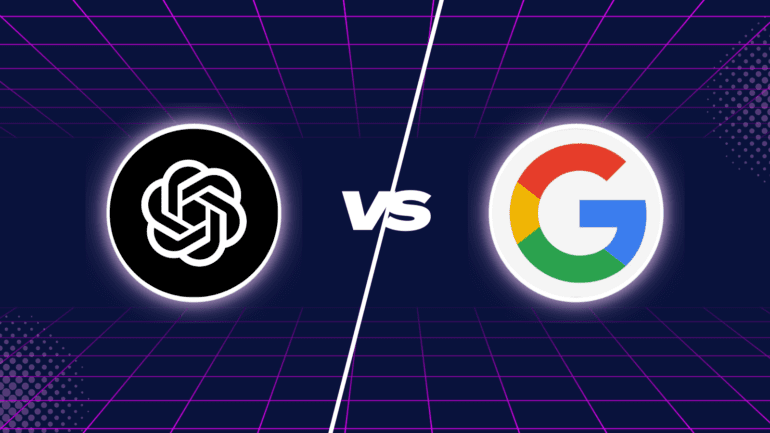TL;DR:
- Google and OpenAI are locked in a fierce competition to dominate the field of AI-generated content and SEO algorithms.
- Google has aggressively updated its SEO algorithm over the past year to counter the threat posed by AI content.
- OpenAI’s GPT-4 Turbo, trained on data up to April 2023, promises real-time relevance in content generation.
- Google’s SEO algorithm focuses on user-centric content, penalizing outdated AI-generated content.
- Microsoft’s investment in OpenAI aims to challenge Google’s dominance in the search engine market.
- “Humans-in-the-loop” strategy is crucial for companies using AI-generated content to maintain SEO rankings.
- The battle between Google and OpenAI signifies a key shift in the digital marketing landscape.
Main AI News:
In the ever-evolving landscape of digital dominance, the AI search wars between tech giants Google and OpenAI have officially commenced. Google, the reigning advertising and search engine behemoth, has been relentless in altering its SEO algorithm over the past year, an unsurprising move considering the growing threat posed by AI-generated content. As with any dominant player, Google does not take challenges to its monopoly lightly.
This dogfight for supremacy is poised to be a protracted one, with no clear victor in sight. The contenders? Google’s arsenal versus OpenAI’s champions, Bard and ChatGPT. The outcome remains uncertain, leaving us to ponder who will ascend to the skies and who will plummet to the ground.
While generative AI is far from novel in the tech realm, the current hysteria surrounding its proliferation is undeniable. What truly matters now is the real-time impact on businesses and the digital sphere, particularly in the realm of SEO and user behavior on the internet.
During the recent OpenAI DevDay, the company unveiled an array of new features, prominently showcasing the launch of GPT-4 Turbo. A key enhancement of this iteration is that it is trained on data from April 2023, ensuring that it remains up-to-date with information no more than a year old. As this product evolves, it will inch closer to real-time data, promising fewer “hallucinations,” reduced errors, and a departure from the feeling of reading yesterday’s newspaper.
On the opposing front, Google seems to resist this progressive trend, which is evident in its numerous SEO algorithm updates over the past year. These monthly changes resemble a manifesto outlining its stance on AI-generated content. Google’s objective is clear: it wants everything to be the latest news. This poses a substantial challenge for OpenAI, as GPT-4 Turbo’s training data only extends up to April 1st of this year. Google’s strategy appears to be an attempt to divert OpenAI users towards Bard.
While Google’s approach may seem strategic, it also bears a resemblance to King Canute’s futile effort to command the waves to recede while sitting in shallow water—a challenging endeavor fraught with its own limitations. Generative AI is likely to find ways to circumvent these algorithms, much like it navigates CAPTCHAs and other attempts to verify human identity.
Google’s SEO algorithm prioritizes user-centric content, penalizing GenAI content that fails to keep pace with the latest relevant news and product updates. Even though April 2023 is more recent than a year ago, it still lags behind the present. Currently, Bard may seem closer to doggerel than poetry, displaying questionable grammar rather than literary finesse. Nonetheless, even a stopped watch tells the right time twice a day.
Google finds itself racing to catch up, with Microsoft investing over $10 billion in OpenAI, seeking to bolster its oft-derided Bing search engine. Losing ground to Bing is Google’s worst nightmare. As it stands, Google relies on its SEO supremacy to hold back the tide while it builds and enhances its own Language Models (LLMs), aiming to make Bard superior to ChatGPT and Bing.
For now, companies employing GenAI must utilize “humans-in-the-loop” to safeguard their SEO rankings. This approach is imperative, particularly for businesses in fast-paced e-commerce environments, as failure to do so may lead to virtual obscurity, according to Google’s vision.
The current state of affairs favors companies that incorporate humans-in-the-loop, marking them as distinct from AI-only counterparts and insulating them from Google’s potentially detrimental strategy. While this dynamic may not persist indefinitely, for e-commerce enterprises, the present is paramount, and its real-time developments matter most to both existing and potential customers.
As Google and OpenAI engage in this battle for supremacy, ChatGPT and Microsoft are undoubtedly devising strategies to alter the current landscape. In the ever-accelerating world of technological advancement, whether in April, November 2023 or beyond, change unfolds at a pace that challenges both human and AI adaptation.
These conflicts between humans and AI in the realm of search could very well serve as the pivotal battleground determining the outcome of this dogfight. For now, those who incorporate “humans-in-the-loop” stand as the victors. Let the games begin, and may the odds be ever in your favor, Google and OpenAI.
Conclusion:
The ongoing battle between Google and OpenAI for supremacy in AI-generated content and SEO algorithms signifies a significant shift in the digital marketing landscape. With Microsoft backing OpenAI’s efforts to challenge Google’s dominance, companies must adopt a “humans-in-the-loop” strategy to safeguard their SEO rankings. This competition underscores the growing importance of AI in digital marketing and the need for businesses to stay ahead in the evolving world of AI-generated content.

